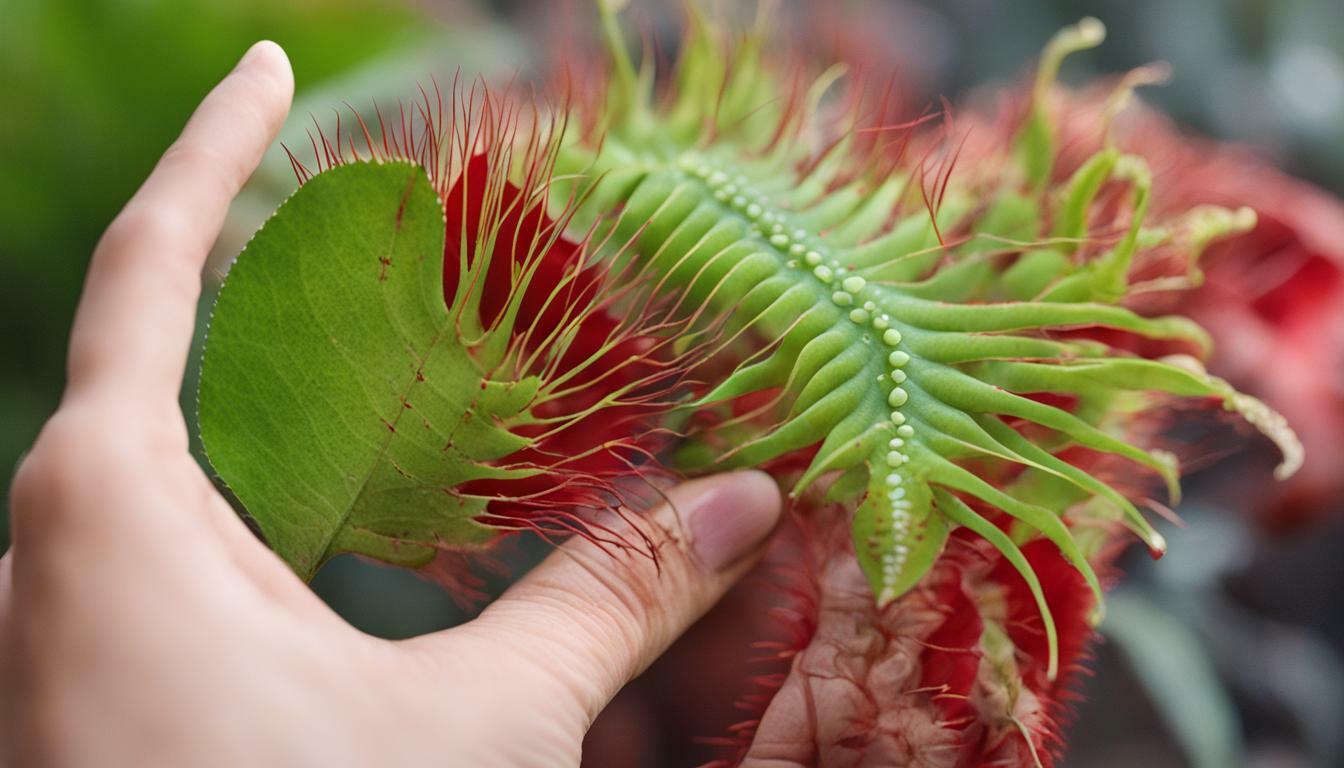Plants are often seen as passive organisms that lack complex behaviors and capabilities, but recent studies have challenged this assumption. The Venus flytrap, in particular, exhibits a unique behavior that has drawn attention from researchers and plant enthusiasts alike. But do Venus flytraps have emotions? Let’s explore this intriguing topic.
Key Takeaways:
- Venus flytraps exhibit fascinating behavior, including their trapping mechanism and response to stimuli.
- Plants may lack a nervous system, but they can still exhibit complex behaviors and communication through chemical signaling.
- While Venus flytraps do not possess emotions as humans do, their behaviors suggest a level of cognitive ability and responsiveness to their environment.
Venus Flytrap Behavior: Understanding How They Work
As one of the most iconic carnivorous plants, Venus flytraps have captivated scientists and nature lovers alike with their unique behavior and trapping mechanism. The plant’s cognitive abilities and ability to respond to external stimuli have also sparked questions about whether it possesses emotions.
The Venus flytrap’s trapping mechanism consists of specialized leaves that form a trap. Each trap contains small trigger hairs, which must be touched twice within 20 seconds to activate the trap. Once triggered, the trap quickly closes, enveloping its prey in a leafy prison. The Venus flytrap then digests the trapped prey using digestive enzymes.
But how do Venus flytraps detect prey? It turns out that the plant is actually quite sensitive to touch and chemical cues. The trigger hairs on the trap are extremely sensitive, and even a small insect crawling on the surface can trigger the trap. Additionally, the plant can detect changes in the environment, such as when a fly lands on the leaf and disturbs the air around it, triggering the trap.
While the Venus flytrap lacks a nervous system, it can still exhibit complex behavior and respond to external stimuli. Studies have shown that the plant can remember when it has recently caught prey and adjust its trapping mechanism accordingly. It can also respond to touch and other stimuli with electrical signals, similar to those found in animal nervous systems.
Overall, the behavior of Venus flytraps is a fascinating area of study for plant scientists and nature enthusiasts alike. By understanding the cognitive abilities and behavior of these unique plants, we can gain insight into the complex and sophisticated nature of plant life.
The Science Behind Emotions in Plants
Although we may anthropomorphize plants and ascribe emotions to them, the scientific understanding of emotions in plants is still evolving. While plants lack a nervous system, they can exhibit complex behaviors and responses to stimuli.
Emotions involve a subjective experience of feeling, which plants lack. Instead, their responses are primarily sensory-driven, such as detecting changes in light, temperature, and touch. However, recent studies suggest that plants possess a sort of emotional intelligence, allowing them to perceive and respond to environmental cues.
In the case of Venus flytraps, their sensory responses are particularly fascinating. They exhibit a unique trapping mechanism that involves specialized hairs, which, when triggered, cause the trap to snap shut. This response is triggered by the presence of prey, which the plant is able to detect through chemical cues.
While plants do not experience emotions in the same way humans do, they are able to adapt and respond to their environment in remarkable ways. Further research is needed to fully understand the cognitive abilities of plants, including those of Venus flytraps.
Observing Venus Flytrap Reactions
Recent studies have shed light on the intriguing emotional-like behavior of Venus flytraps. While they do not possess emotions as humans do, they exhibit fascinating responses to stimuli such as touch or chemical cues.
Researchers have observed that Venus flytraps can distinguish between different prey and adjust their trapping mechanism accordingly. For example, they can differentiate between live and dead prey, adjusting the force of their trap to avoid expending unnecessary energy.
Additionally, studies have shown that Venus flytraps can communicate with each other through chemical signaling. When one plant is fed, it can release chemicals that signal to nearby plants to prepare for potential prey.
Overall, while Venus flytraps do not experience emotions in the same way humans do, their complex behaviors and responses to stimuli suggest a level of emotional intelligence and communication with their environment.
Plant Communication and Adaptation
Plants, including Venus flytraps, communicate with their surroundings through chemical signals. The release of specific chemicals can attract pollinators or repel predators. Venus flytraps may use chemical signaling to communicate with other plants in their environment or to alert nearby vegetation of potential threats.
Emotional-like behaviors in plants, such as those exhibited by Venus flytraps, serve an adaptive purpose. The trapping mechanism of Venus flytraps is an energy-intensive process, and the plant likely utilizes emotional-like responses to optimize nutrient intake. By sensing and responding to prey, the plant can conserve energy and avoid wasting its resources on false alarms.
Furthermore, research indicates that plants can adapt to their environment through learning and memory formation, suggesting a level of cognitive ability beyond mere sensory responses. Venus flytraps, for example, have been shown to learn from past experiences and adjust their trapping mechanisms accordingly.
Emotional Intelligence in Plants
While Venus flytraps do not possess emotions in the way that humans do, they exhibit fascinating cognitive abilities that are worth exploring. The concept of emotional intelligence in plants has gained attention in recent years, as studies have revealed that plants can perceive and respond to a variety of environmental cues.
The Venus flytrap, for example, has been shown to possess memory formation capabilities, allowing it to learn from past experiences and adapt its behavior accordingly. This suggests a level of cognition that is not generally associated with plants.
Furthermore, the Venus flytrap’s ability to detect and respond to external stimuli, such as touch or chemical cues, demonstrates a complex sensory system that is not entirely understood. While plants lack a nervous system, they have been found to possess specialized cells, called mechanoreceptors, that can detect mechanical stimuli.
Additionally, research has suggested the presence of chemical signaling and communication between plants, indicating a level of information exchange and cooperation that was previously unknown.
Overall, while Venus flytraps and plants in general may not exhibit emotions in the way that humans do, their sophisticated behaviors and abilities suggest a level of intelligence and cognition that is still being studied and understood.
Conclusion
After exploring the fascinating behaviors and cognitive abilities of Venus flytraps, it’s clear that these plants exhibit complex responses to environmental stimuli. However, the question remains: does a Venus flytrap have emotions?
While some may argue that the behaviors of Venus flytraps resemble emotional responses, it’s important to note that plants lack a nervous system and the ability to experience emotions as humans do. Scientists currently understand the plant’s responses to be a result of complex, sensory-driven processes rather than emotional behavior.
Despite this distinction, the study of plant behavior and cognition has revealed remarkable adaptive advantages of emotional-like behaviors. Venus flytraps and other plants can optimize nutrient intake, minimize energy expenditure, and communicate with their environment through chemical signaling.
In conclusion, while Venus flytraps do not possess emotions as we understand them, their incredible responses to external stimuli continue to captivate and intrigue scientists and nature lovers alike.
Can Emotions Affect How Venus Flytraps Are Targeted by Pests?
Can emotions play a role in preventing pests with venus flytraps? Venus Flytraps are known for their ability to capture insects, but recent research suggests that their success may be influenced by the emotional state of the plant. When Venus Flytraps are stressed or in a weakened state, they emit volatile compounds that attract pests, making them more vulnerable. By maintaining a healthy and well-cared-for Venus Flytrap, we can potentially enhance their ability to ward off pests and optimize their natural insect-trapping capabilities.
FAQ
Q: Does a Venus Flytrap have emotions?
A: No, Venus Flytraps do not have emotions. While they exhibit complex behaviors and responses, they lack the necessary components, such as a nervous system, to experience emotions like humans do.
Q: What is the behavior of Venus Flytraps?
A: Venus Flytraps have a unique trapping mechanism to catch prey. They use specialized hairs on their leaves that, when stimulated by touch or chemical cues, trigger the trap to close. This behavior allows them to capture insects for sustenance.
Q: Can plants feel emotions?
A: Plants do not possess emotions in the same way that humans do. While they can respond to stimuli and exhibit behaviors, their responses are more akin to sensory responses rather than emotional experiences.
Q: How do Venus Flytraps respond to stimuli?
A: Venus Flytraps respond to stimuli through their trapping mechanism. When the trigger hairs on their leaves are touched by an insect or other small prey, the trap closes rapidly to capture the prey. This response helps them secure nutrients for survival.
Q: How do Venus Flytraps communicate with their environment?
A: Venus Flytraps may utilize chemical signaling to communicate with their environment. This communication can occur through the release of specific chemicals that attract or repel certain organisms, helping the plant adapt to its surroundings.
Q: Do Venus Flytraps have cognitive abilities?
A: Venus Flytraps exhibit cognitive abilities such as memory formation and learning from past experiences. They can remember the presence of prey and adjust their trapping response accordingly, indicating a level of cognitive processing in their behavior.
Q: In conclusion, do Venus Flytraps have emotions?
A: No, Venus Flytraps do not have emotions. While they display complex behaviors, their responses are driven by sensory cues and adaptations for survival, rather than emotional experiences.











